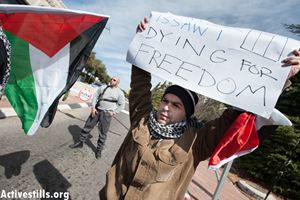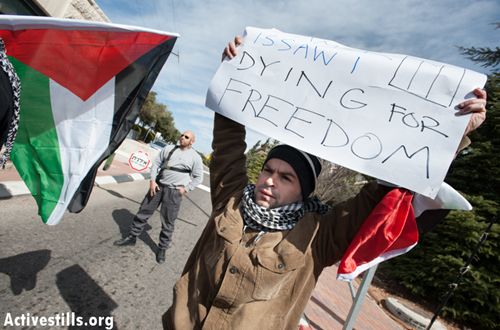
Four Palestinian detainees on hunger strike are being held in Israeli prisons. Two of these detainees, Ayman Sharawna and Samer Issawi, were released during the October 2011 prisoner exchange that freed captive Israeli soldier Gilad Shalit, but were re-arrested by Israeli authorities in accordance with a decision of the Committee on Violations of Terms of Release, which was established by Israeli authorities shortly before the exchanged deal was concluded.
Ayman Sharawna was arrested over a year ago, in January 2012, and launched a hunger strike in July 2012. The Committee has not yet determined how long his prison sentence is going to be. Six months ago, he appealed the Committee’s decision to re-arrest him, but since a date for his hearing has not yet been set, his lawyer appealed to the Supreme Court, which is expected to hear his case on February 20. Sharawna has waged a hunger strike since July, except for a brief reprieve in January, when he believed his case was proceeding forward.

Palestinian activists block the entrance to Efrat settlement in a protest in solidarity with hunger striker Samer Issawi, February 15, 2013 (Photo: Activestills)
Samer Issawi was arrested in July 2012 and launched a hunger strike in August 2012 (but we are not sure of the full details of the strike). The Committee has not yet ruled on the appeal filed by his lawyers. At this time, Physicians for Human Rights (PHR) does not possess up-to-date information on the health of these individuals. The last time a doctor associated with PHR saw Sharawani was a month ago Issawi refused to see our doctor that day, probably as part of the protest.
Two additional persons, Jafar Ezzedin and Tariq Qaa’dan, have been held in administrative detention since November 2012. Shortly after their detention, both launched hunger strikes. During a visit conducted by a PHRaffiliated lawyer on February 12, the two reported that they are only drinking water, and that their health is deteriorating. Ezzedin and Qaa’dan expressed several times and to various authorities their wish to be monitored and to receive impartial medical consultation from physicians associated with PHR, which they see as a neutral and trustworthy organization; this request has gone unanswered. In protest against their continued denial of impartial medical care, as well as their continued maltreatment by Israeli authorities throughout the duration of their strike, Ezzedin and Qaa’dan have refused to cooperate with medical doctors.
According to PHR, both Ezzedin and Qaa’dan are refusing medical treatment or the provision of enriching supplements, such as vitamins and minerals. Several days ago, on February 10, they were transferred to Assaf Harofeh Hospital despite their proclaim protests, after a decision of the IPS Medical Committee. According to the two detainees, they were transferred against their will by a large contingent of IPS prison guards. They also reported that they were forced to undergo several medical tests at the hospital, despite their continuous refusal of any and all medical treatment, and that their wrists and ankles were shackled to their hospital beds.
Physicians for Human Rights – Israel is gravely concerned by the conduct of various Israel authorities, whose actions repeatedly violate hunger strikers’ human rights and contravene Israeli laws and regulations, international conventions, and guidelines on medical ethics. In contradiction to the IPS’ own regulations, the recommendations issued by PHR affiliated physicians after visiting and examining hunger striking prisoners have been completely disregarded. Furthermore these individuals continue to be shackled to their hospital beds, in violation of medical ethics and the guidelines of the Ministry of Health, Israeli Medical Association, and IPS.
The Israel Prison Service continues to prevent monitoring of hunger strikers by impartial physicians. It is important to note that PHR has submitted dozens of requests to visit hunger strikers, but since February 2012 these requests have gone unanswered, and have been successful only after court intervention. PHR last request to visit the two hunger strikers was submitted on January 17, 2013. Furthermore, in violation of international conventions, these hunger strikers have been denied family visits, despite their life-threatening health condition. All of this is in addition to the fact that they are being held under administrative detention on classified security grounds and are denied fair and legal due process and the legal tools to defend themselves. Prof. Raphi Walden, Co-Chairman of Physicians for Human Rights, added: “The fact that hunger strikers are denied the right to health by the Israel Prison Service, while the courts ignore the rights of prisoners and detainees, illustrates the systematic moral, ethical, and professional failure of multiple Israeli institutions.”
Related:
Nazareth activists set up ten to support Palestinian hunger strikers


